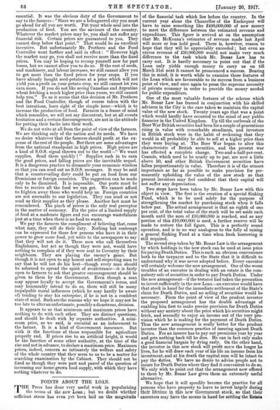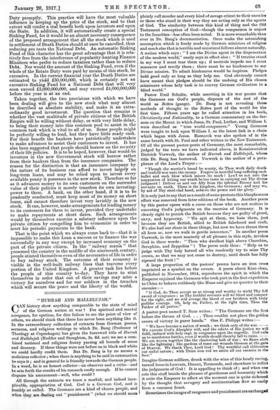POINTS ABOUT THE LOAN.
THE Press has done very useful work in popularizing the terms of the new Loan but wo doubt whether sufficient stress has even yet been laid on the magnitude of the financial task which lies before the country. In the current year alone the Chancellor of the Exchequer will have to raise something like L400,000,000 of new money to meet the difference between the estimated revenue and expenditure. This figure is arrived at on the assumption that Mr. McKenna's estimates of revenue made last April will more or less hold good. There is, howilver, reason to hope that they will be appreciably exceeded ; but even an excess revenue of £50,000,000 would not make very much difference to tha task which Mr. Bonar Law has to carry out. It is hardly necessary to point out that if the Loan only yields enough money to carry us on till March 31st next it cannot be pronounced a success. Bearing this in mind, it is worth while to examine those features of the Loan which are favourable to its success from a business point of view, and once again to press the supreme necessity of private economy in order to provide the money needed for public expenditure.
One of the most valuable features of the scheme which Mr. Boner Law has framed in conjunction with his skilled advisers in the City is the care taken to maintain the capital value of the new stock. Twenty years ago that was a point which would hardly have occurred to the mind of any public financier in the United Kingdom. Up till the outbreak of the Boer War British securities had been for a couple of generations rising in value with remarkable steadiness, and investors in British stock were in the habit of reckoning that they would in all probability be able to sell at a higher price than they were buying at. The Boer War began to alter this characteristic of British securities, and the present war has effected a complete change. Two-and-a-half-per-cent. Consols, which used to be nearly up to par, are now a little above 50, and other British Government securities have fallen proportionately in value. Therefore it is of the utmost importance as far as possible to make provision for per- manently upholding the value of the new stock so that present investors may feel confident that their capital will not suffer any depreciation.
Two steps have been taken by Mr. Bonar Law with this object in view. The first is the creation of a special Sinking Fund, which is to be used solely for the purpose of strengthening the market by purchasing stock when it falls below par. The actual arrangement is that an eighth of one per cent. of the total value of the stock will be set aside each month until the sum of £10,000,000 is reached, and as any portion of this £10,000,000 is used, a further reserve will be made to restore the full figure. This is a perfectly sound operation, and is in no way analogous to the folly of raising a general Sinking Fund at a time when fresh borrowing is still required.
The second step taken by Mr. Bonar Law is the arrangement by which holdings in the new stock can be used at issue price for paying Death.Duties. This is such an obvious convenience both to the taxpayer and to the State that it is difficult to understand why it was never adopted before. Every executor will certainly welcome the new arrangement. One of the worst troubles of an executor in dealing with an estate is the com- pulsory sale of securities in order to pay Death Duties. Under the new arrangement—if the testator had taken the precaution to invest sufficiently in the new Loan—an executor would have that stock in hand for the immediate settlement of the State's claim for Death Duties, and no selling of securities would be necessary. From the point of view of the prudent investor the proposed arrangement has the double advantage of enabling him first to make precise provision for Death Duties without any anxiety about the price which jiis securities might fetch, and secondly to enjoy an income out of the very pro- vision which he is making for the payment of Death Duties. Thus the new arrangement is really better for the prudent investor than the common practice of insuring against Death Duties. For an insurer has to pay out premiums year by year and gets nothing back till he dies. He can in fact only make a good financial bargain by dying early. On the other hand, the investor in this new stock will profit more the longer he lives, for he will draw each year of his life an income from his investment, and at his death the capital sum will be intact to pay the duties. We have no desire to advise people not to insure for Death Duties where they find it convenient to do so. We only wish to point out that the arrangement now offered to them by Mr. Bonar Law gives them an extremely useful alternative.
We hope that it will speedily become the practice for all persons who have property to leave to invest largely during their lifetime in this new Government stock, so that their executors may have the means in hand for settling the Estate Duty promptly. This practice will have the most valuable influence in keeping up the price of the stock, and to that extent' will confer a real benefit both upon investors and upon the Stite. In addition, it will automatically create a special Sinking Fund, for it would be an almost necessary consequence of the proposed arrangement that all the stock which is used in settlement of Death Duties should at once be cancelled, thus reducing pro fordo the National Debt. An automatic Sinking Fund of this character has the great advantage that it is rela- tively free from the interference of popularity-hunting Finance Ministers who prefer to reduce taxation rather than to reduce Debt. Nor would the amount of the Sinking Fund, even if the whole of the Estate Duty were paid by means of this stock, be excessive. In the current financial year the Death Duties are estimated to yield £30,000,000, which is certainly not an excessive Sinking Fund for a National Debt that will very soon exceed £3,000,000,000, and may exceed £4,000,000,000 before the year is at an end.
Taken together, the two provisions with which we have been dealing will give to the new stock what may almost be described as absolute stability, and make it an extra- ordinarily good investment. The question that remains is whether the vast multitude of private citizens of the British Empire will be willing without delay, or with very little delay, to bring their money into this common pool to assist in the common task which is vital to all of us. Some people might be perfectly willing to lend, but they have little ready cash. For their benefit the bankers have patriotically undertaken to make advances to assist their customers to invest. It has also been suggested that people should borrow on the security of their life policies. It is to be hoped, however, that would-be investors in the new Government stock will borrow rather from their bankers than from the insurance companies. The reason for the distinction is that an insurance company by the nature of its business can afford to invest largely on long-term loans, and may be relied upon to invest every available penny it possesses in the new stock. Therefore so far as it advances money to its own customers on the surrender value of their policies it merely transfers its own investing- power to them. A bank, on the other hand, if it is to be prudently conducted, must keep most of its money on short loans, and cannot therefore invest very lavishly in the new stock. It can, however, make arrangements for lending money to its customers for them to invest, provided they undertake to make repayments at short dates. Such arrangements would by themselves exercise a salutary influence upon the private citizen by compelling him to economize in order to meet his periodic payments to the bank.
That is the point which we always come back to—that it is impossible to make this Loan a success or to finance the war successfully in any way except by increased economy on the part of the private citizen. In the " railway mania " that possessed the country in the middle of the nineteenth century, people stinted themselves even of the necessaries of life in order to buy railway stock. The outcome of their economy is visible in the well-built railway lines that traverse every portion of the United Kingdom. A greater task lies before the people of this country to-day. They have to stint themselves in order that out of their savings may arise a victory for ourselves and for our soldiers in the trenches which will secure the peace and the liberty of the world.



































 Previous page
Previous page